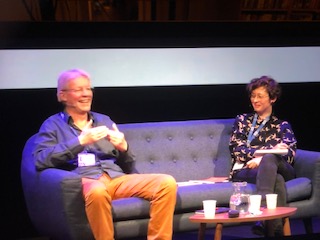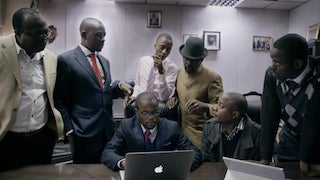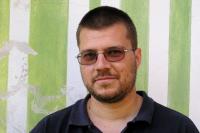Hun kigger dig lige ind i øjnene. Hun har lige forklaret, hvorfor hun mener at maleriet som hun restaurerer er malet af Leonardo da Vinci. Hun har peget på det sted, hvor Leonardos teknik er tydelig, på samme sted som i Mona Lisa. Hun lægger et klæde henover staffeliet i sit studio i New York, tager elevatoren ned og går ud på gaden. Dianne Modestini ringer til Robert Simon, en af de to ejere af maleriet for at videregive resultatet af undersøgelsen.
Det er en smuk sekvens, en filmisk sekvens som gør Modestini til min hovedperson og filmens, tydeligvis, for der vendes tilbage til hende og til hendes ”lost love”, Mario Modestini, som så maleriet før sin død i 2006 og sagde at det var malet af en vigtig kunstner ”på Leonardos tid”, det vil sige omkring 1500, højrenaissancen.
Jeg tror på hende, men filmskaberne lader mig ikke blive i troen. En tysk
museumsmand sidder i billedet og mener ikke at maleriet kan tillægges Leonardo, det er alt for tidligt at fastslå det, der er ingen proveniens og han tilføjer at værkets kvalitet skyldes Dianne Modestinis pensel og kunstneriske formåen at få det til at ligne en Leonardo. Denne uforskammethed, synes jeg, som er på den fine ældre dames side, tilbagevises helt af hendes selv. Men der kommer senere mange flere tvivlere OG der kommer udsagn, som mener som Modestini at det er mesteren og ikke en af hans elever, som har ført penslen.
Filmen bølger elegant mellem de mange meninger og vurderinger fra et hold af mere eller mindre store EGO’er fra den kommercielle kunstverden, som Modestini kalder ”tricky”; det er vist en underdrivelse! Det er meget underholdende og helt absurd at følge historien om et maleri, overmalet og med mange skader, blive købt for 1175$ for at ende med et salg på noget af et show på auktionshuset Christie for 450millioner $.
Men ind imellem kommer der så nogle smukke sekvenser med Modestini i hendes lejlighed og i det hus i Toscana, hvor hun tilbragte tid med sin nu afdøde mand, som hun fører dialog med under arbejdet med restaureringen – og med Leonardo, som hun siger det. Og Jesus, Salvator Mundi. Da hun vandrer i haven ved huset i Toscana, dukker Mario pludselig op for enden mellem nogle træer. Et øjeblik og så er han væk igen. En flot detalje! Det er en kærlighedshistorie, som bevæger og som instruktør Andreas Koefoed, fotograf Adam Tandrup og klipper Nicolas Staffolani Nørregaard har vævet flot ind i hovedhistorien. Og lad mig lige igen kippe med flaget for instruktør Koefoed, hvis efterhånden mange film, i forskellige stilarter, placerer ham stærkt i nutidig dansk dokumentarisme: ”At Home in the World”, ”The Ghost of Piramida”, ”Våbensmuglingen”, ”Albert’s Winter”… og lige nu arbejder han med Jørgen Leth på en jazz-film.
Tilbage til fortællingen om kunstverdenen, filmens hovedfokus, som skrevet en helt absurd verden, her befolket af mere eller mindre selvoptagne personligheder, som – næsten alle – nyder at tale med Koefoed og blive placeret i en visuel komposition af Adam Tandrup. Kritikeren Jerry Saltz der morsomt imiterer auktionernes showprægede forløb. Franskmanden Jacques Franck som skrev til sin præsident og frarådede at maleriet blev udstillet på Louvre. Og argumenterer for hvorfor han ikke mener det kan være en Leonardo. Sleeper Hunter (pragfuldt udtryk) Alexander Parish som fandt maleriet på en auktion i New Orleans, elsker at fortælle ”sin” historie. Og Luke Syson fra National Gallery i London hvor maleriet blev udstillet i 2011 som en Leonardo – og besøgstallet på det fine museum slog alle rekorder – Koefoed går til Syson, som med flakkende øjne undviger at svare på spørgsmålet om, hvad det betød for ham…
Og amerikanske Kenny Schachter som siger hvad vi som tilskuere oplever i filmen: Alt det her handler kun om én ting: MONEY.
Det bliver sagt endnu mere klart af Yves Bouvier som introduceres (!) af en sekvens hvor han balancerer som en cirkusartist på ét hjul. Bouvier er manden, som på en dag tjener mere end 40 millioner $ ved at købe ”Salvator Mundi” og sælge den videre til en russisk oligark, Dmitri Rybolovlev, som ikke optræder i filmen, men vi får at vide, at der nu kører retssager mod Bouvier fra den russiske billionær, som føler sig snydt. Den meget underholdende showman Bouvier siger i filmen at han opfatter sig selv som en købmand, der bare arbejder efter de almindelige markedsregler. Og et for mig ukendt fænomen introduceres, såkaldte freeports, hvor kunsthandlere og -samlere kan deponere kunstværker.
Der er også en CIA-mand, en FBI-mand, en bankmand… og journalister og andre eksperter ud i kunstens vidunderlige og vanvittigt kommercielle verden.
Dianne Modestini siger det: Nu er en Leonardo gemt væk for offentligheden indtil Mohammad bin Salman, den saudiarabiske prins og forbryder har fået lavet sit museum, hvor maleriet kan hænge. Pt. menes det at befinde sig på hans yacht! 450Millioner $ kostede det for MBS i 2013. Parish og Robert Simon købte det for 1175$ i 2005.
MBS ville dog gerne have maleriet udstillet på Louvre, fortalte han vist Macron og museet, der selvfølgelig gerne ville udstille det, fik lavet en teknisk undersøgelse af ”Salvator Mundi”, producerede en bog derom, som konkluderede som Modestini at den er god nok, det er en Leonardo… bogen blev trykt men kom ikke til offentligheden for MBS ønskede maleriet på samme væg som ”Mona Lisa” men det kunne museet ikke gå med til.
Filmen er fremragende. De mange talking faces er sat sammen så der er et flow i fortællingen, et drive der holder opmærksomheden fangen, samtidig med at der gives plads til fine visuelle detaljer og kærlighedshistorien med Modestini.
At det er et dansk produktionsselskab Elk Film med instruktør og producer Andreas Dalsgaard i spidsen, der sammen med det franske selskab Pumpernickel Films, har sat dette kolossale skib i søen, kan kun aftvinge et kæmpe BRAVO.
Danmark, Frankrig, Sverige, 2021, 96 mins.





